Utility Carts - Buyer's Guide
Date Posted:23 July 2024
When selecting a utility cart from MHA Products, consider factors such as load capacity, material construction, design configuration, maneuverability, and additional features to ensure it meets your specific requirements.
Utility carts are versatile tools used in various industries for transporting supplies, equipment, and materials efficiently and conveniently. These carts come in a range of sizes, configurations, and materials to suit different applications, from organizing tools in workshops to serving meals in hospitality settings. When selecting a utility cart, it's essential to consider factors such as load capacity, material construction, maneuverability, and additional features to ensure it meets your specific needs. In this buyer's guide, we'll explore key considerations when choosing a utility cart from MHA Products, a reputable provider of industrial equipment and solutions.
Utility carts, also known as service carts or rolling carts, play a crucial role in streamlining material handling and organizational tasks in various workplaces. Whether you're working in a warehouse, office, healthcare facility, or hospitality establishment, a well-designed utility cart can improve efficiency, productivity, and workplace safety. By understanding the key features and considerations outlined in this guide, you can select the right utility cart to meet your specific requirements and enhance workflow optimization.
Key Considerations for Utility Carts
1. Load Capacity:
- Weight Rating: Determine the maximum load capacity required for the utility cart based on the types of items you'll be transporting or storing. Consider both the weight of individual items and the total load to ensure the cart can safely support the intended workload.
2. Material Construction:
- Durability: Choose a utility cart constructed from durable materials such as steel, aluminum, or high-density polyethylene (HDPE). The material should be sturdy enough to withstand the demands of daily use and resist corrosion, rust, or damage.
- Hygiene and Cleanliness: Consider the material's ease of cleaning and maintenance, especially for utility carts used in healthcare or food service settings where hygiene is critical. Non-porous and non-absorbent materials are preferable to prevent the buildup of dirt, grime, or bacteria.
3. Design and Configuration:
- Shelving Options: Evaluate the number of shelves and the configuration of the utility cart to ensure it provides sufficient storage space and organization for your needs. Some carts feature adjustable or removable shelves for flexibility and customization.
- Lipped Shelves: Look for utility carts with lipped or raised edges on the shelves to prevent items from sliding or falling during transport, reducing the risk of accidents or damage.
4. Maneuverability:
- Wheel Type: Consider the type and size of wheels used on the utility cart, such as swivel casters or fixed wheels. Swivel casters provide greater maneuverability and ease of navigation, especially in tight spaces or crowded environments.
- Wheel Material: Choose wheels suitable for the floor surface and environment, such as non-marking rubber or polyurethane wheels for indoor use, or pneumatic wheels for outdoor terrain.
5. Additional Features:
- Handle Design: Look for utility carts with ergonomic handle designs that provide a comfortable grip and allow for easy pushing or pulling. Some carts feature adjustable handles to accommodate users of different heights.
- Accessory Attachments: Consider utility carts with accessory attachments or customization options, such as hooks, bins, or holders, to optimize organization and storage for specific tasks or tools.
Top Utility Carts from MHA Products
- Heavy-Duty Steel Utility Cart:
- Description: This heavy-duty utility cart features a robust steel frame and multiple shelves, making it ideal for transporting heavy loads or bulky items in industrial environments.
- Features: High load capacity, durable steel construction, lipped shelves for item security, swivel casters for easy maneuverability, and ergonomic handle design.
- Applications: Suitable for warehouses, workshops, and manufacturing facilities for organizing tools, parts, and equipment.
- Plastic Utility Cart with Shelves:
- Description: This lightweight and versatile utility cart is constructed from durable plastic and features multiple shelves for organizing and transporting supplies or materials in offices or healthcare facilities.
- Features: Lightweight plastic construction, easy-to-clean surfaces, adjustable shelves for customization, swivel casters for smooth movement, and ergonomic handle design.
- Applications: Ideal for office settings, hospitals, and laboratories for storing and transporting files, documents, medical supplies, or equipment.
When selecting a utility cart from MHA Products, consider factors such as load capacity, material construction, design configuration, maneuverability, and additional features to ensure it meets your specific requirements. Top models like the Heavy-Duty Steel Utility Cart and the Plastic Utility Cart with Shelves offer reliability, durability, and versatility for a wide range of applications. By evaluating these key considerations and choosing the right utility cart for your needs, you can optimize efficiency, organization, and convenience in your workplace.


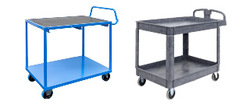
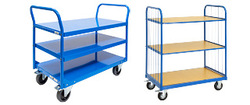
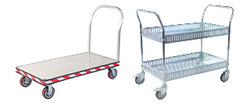
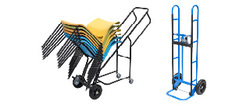
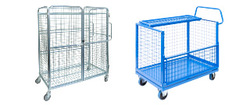
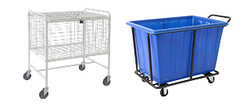
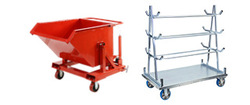
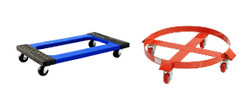
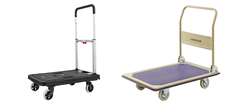
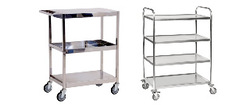
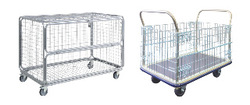
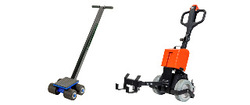
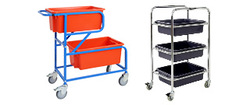
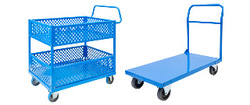
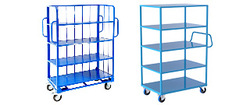
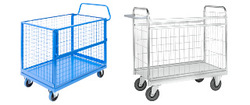
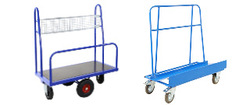
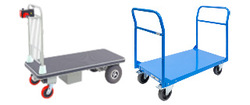
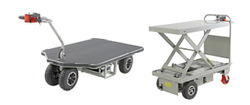
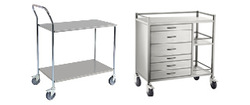
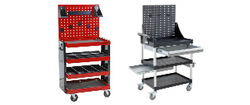
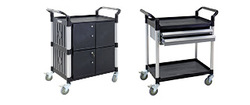
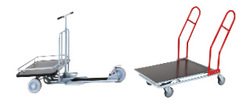
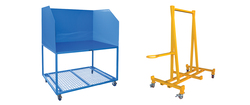



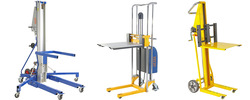



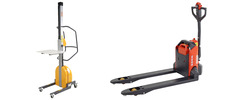
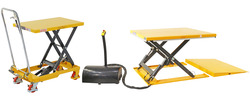
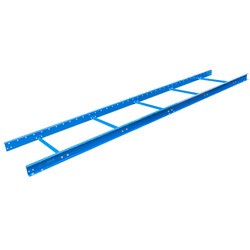
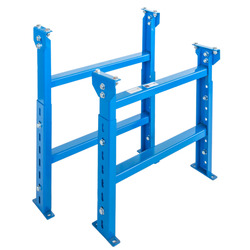
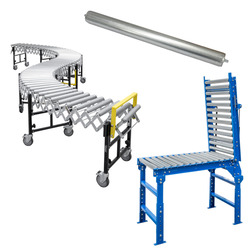
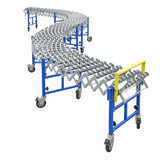



















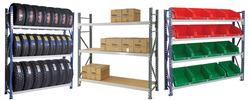
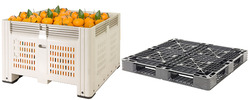
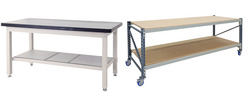
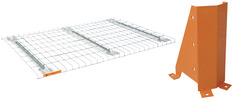
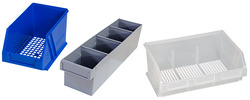

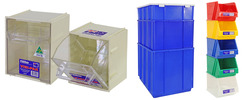

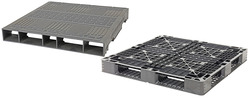
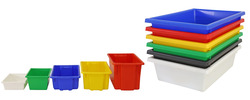
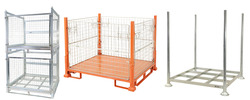
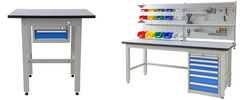
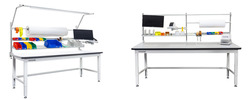

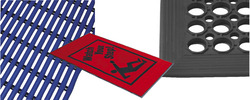
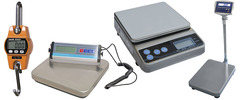



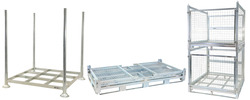
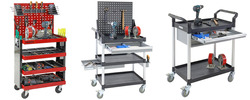
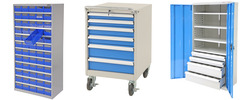
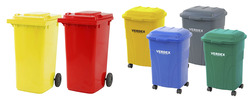
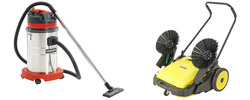












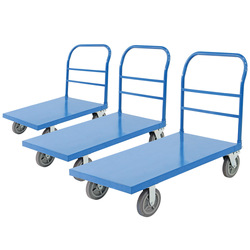






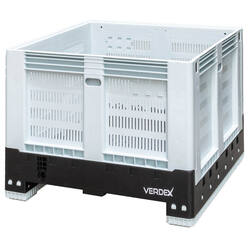





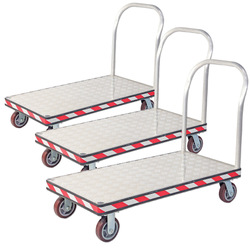






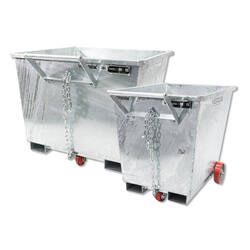





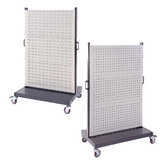







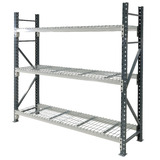






 Trolleys / Hand Trucks
Trolleys / Hand Trucks 2 Tier Trolleys
2 Tier Trolleys 3 Tier Trolleys
3 Tier Trolleys Aluminium Trolleys
Aluminium Trolleys Appliance & Hand Trucks
Appliance & Hand Trucks Cage Trolleys
Cage Trolleys Cleaning Carts & Trolleys
Cleaning Carts & Trolleys Construction Trolleys
Construction Trolleys Dollies
Dollies Foldable Trolleys
Foldable Trolleys Hospital Trolleys
Hospital Trolleys Laundry/Linen Trolleys
Laundry/Linen Trolleys Load Skates & Tow Tugs
Load Skates & Tow Tugs Mail / Office Trolleys
Mail / Office Trolleys Multi Purpose Trolleys
Multi Purpose Trolleys Multi-Tier Shelf Trolleys
Multi-Tier Shelf Trolleys Order Picking Trolleys
Order Picking Trolleys Panel Cart Trolleys
Panel Cart Trolleys Platform Trolleys
Platform Trolleys Powered Trolleys
Powered Trolleys Stainless Steel Trolleys
Stainless Steel Trolleys Tool Trolleys
Tool Trolleys Utility Carts
Utility Carts Warehouse Trolleys
Warehouse Trolleys Custom Trolleys
Custom Trolleys Lifting Equipment
Lifting Equipment Forklift Attachments
Forklift Attachments Jib Attachments
Jib Attachments Lifting Hoists & Pallet Hooks
Lifting Hoists & Pallet Hooks Manual Stackers & Lifters
Manual Stackers & Lifters Pallet Jacks
Pallet Jacks Pallet Lifters
Pallet Lifters Pallet Rotators & Dispenser
Pallet Rotators & Dispenser Powered Pallet Trucks & Electric Lifters
Powered Pallet Trucks & Electric Lifters Scissor Lift Trolleys and Tables
Scissor Lift Trolleys and Tables Conveyor Equipment
Conveyor Equipment Conveyor Frames
Conveyor Frames Conveyor Stands
Conveyor Stands Roller Conveyors
Roller Conveyors Skate Wheel Conveyors
Skate Wheel Conveyors Access Equipment
Access Equipment Container & Yard Ramps
Container & Yard Ramps Step Stools & Ladders
Step Stools & Ladders Work Platforms & Crane Cages
Work Platforms & Crane Cages Drum Handling
Drum Handling Drum Storage & Bunding
Drum Storage & Bunding Drum Trolleys & Lifters
Drum Trolleys & Lifters Forklift Drum Handling
Forklift Drum Handling Containment & Spillage
Containment & Spillage Aerosol Cans Storage Cages
Aerosol Cans Storage Cages Bunded Pallets & Storage
Bunded Pallets & Storage Corrosive Goods Storage Cabinets
Corrosive Goods Storage Cabinets Flammable Liquid Cabinets
Flammable Liquid Cabinets Forklift Gas Storage Cages
Forklift Gas Storage Cages Gas Cylinder Storage
Gas Cylinder Storage Site Storage
Site Storage Spill Kits
Spill Kits Stillage Cages
Stillage Cages Waste Handling
Waste Handling Bin Lifters & Tippers
Bin Lifters & Tippers Plastic Waste Bins and Carts
Plastic Waste Bins and Carts Steel Waste and Tipping Bins
Steel Waste and Tipping Bins Storage Equipment
Storage Equipment Heavy Duty Cabinets & Benches
Heavy Duty Cabinets & Benches Heavy Duty Shelving
Heavy Duty Shelving Mega Bins & Pallets
Mega Bins & Pallets Packing Benches
Packing Benches Pallet Racking Accessories
Pallet Racking Accessories Parts Trays & Stor-Pak Bins
Parts Trays & Stor-Pak Bins Pegboard & Louvre Panels
Pegboard & Louvre Panels Plastic Bins
Plastic Bins Plastic Handling Solutions Bins
Plastic Handling Solutions Bins Plastic Pallets
Plastic Pallets Stack & Nest Bins
Stack & Nest Bins Storage Cages
Storage Cages Workplace Equipment
Workplace Equipment Workbenches
Workbenches Modular Workbenches
Modular Workbenches Electric Height-Adjustable Workbenches
Electric Height-Adjustable Workbenches Floor Matting
Floor Matting Industrial Weighing Scales
Industrial Weighing Scales Pallet Wrapping & Packaging Machinery
Pallet Wrapping & Packaging Machinery Ramps
Ramps Stationery Cupboards
Stationery Cupboards Storage and Stillage Cages
Storage and Stillage Cages Tool Trolleys
Tool Trolleys Tooling Cabinets
Tooling Cabinets Wheelie Bins
Wheelie Bins Workshop Equipment
Workshop Equipment Safety Equipment
Safety Equipment Gloves and PPE
Gloves and PPE Pallet Rack Post Protectors
Pallet Rack Post Protectors Safety Barriers & Bollards
Safety Barriers & Bollards Safety Knives & Cutters
Safety Knives & Cutters Signs and Traffic Supplies
Signs and Traffic Supplies Tool & First Aid Boxes
Tool & First Aid Boxes Construction Equipment
Construction Equipment Concrete Equipment
Concrete Equipment General Site Equipment
General Site Equipment Lifting Equipment
Lifting Equipment Site Storage
Site Storage Waste
Waste  MHA's Specials
MHA's Specials












